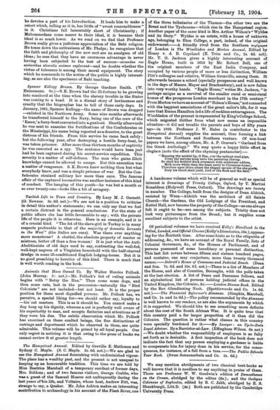The Hampstead Annual. Edited by Greville E. Matheson and Sydney
C. Moyle. (S. C. Mayle. 2s. 6d. net.)—We are glad to see the Hanspstead Annual flourishing with undiminished vigour. The place has a wealthy past, and the present is not unequal to keeping up an honourable tradition. This time we are told by Miss Beatrice Marshall of a temporary resident of former days, Mrs. Siddons ; and of two famous visitors, George Crabbe, who was a guest of the Samuel Hoares not unfiequently during the last years of -his life, and Voltaire, whose host, Andrew Pitt, was, strange to say, a Quaker. Mr. John Ashton makes an interesting contribution to archaeology in his account of the Fleet River, one of the three tributaries of the Thames—the other two are the Brent and the Tyebourne—which rise in the Hampstead region. Another paper of the same kind is Mrs. Arthur Wilson's " Wyldes and its Story." Wyldes is an estate, with a house of unknown age, belonging to Eton College, a part, indeed, of the original endowment.—A friendly rival from the Southern Teptxwpos of London is The Wimbledon and Merton Annual, Edited by Henry v. d. B. Copeland (E. Trim and Co., 2s. 6d. net). Mr. T. G. Jackson gives a highly interesting account of, Eagle House, built in 1613 by Mr. Robert Bell, one of the original members of the East India Company, and occupied by various people of more or less distinction, William Pitt's colleague and relative, William Grenville, among them. It afterwards became a school (specially prosperous and well known in the days of Messrs. Mayer and Brackenbury), and is now fallen into very worthy hands. "Eagle House," writes Mr. Jackson, "is perhaps unique as a survival of the smaller rural or semi-rural homes of Idle prosperous London merchant in the 17th century." From Merton we have an account of" Nelson's House," not connected with the happiest associations of the great sailor's life, for it was here that Emma Hamilton led a life of reckless extravagance. The Wimbledon of the present is represented by King's College School, which migrated thither from what now seems an impossible situation—it did not trouble the parents and boys of fifty years ago—in 1889. Professor J. W. Hales (a contributor to the Hampstead Annual) supplies the account, thus forming a link between the Northern and Southern venture. Of non-local papers we have, among others, Mr. A. P. Graves's "Garland from the Greek Anthology." We may quote a happy little effort in elegiacs (note the effect of the rhyming pentameter) :— " Bunning thy arched lip, 0 Pan, o'er the radiant reed-pipe, Utter thy serious song unto the pasturing throng. So shall his faithful flock evermore with exuberant udders, Milk more white than the foam carry to Clymenus home ; Therefore upon thine altars the shaggy spouse of the she-goatm,, Duly his blood shall yield, lord of the fleck and the field.'






































 Previous page
Previous page